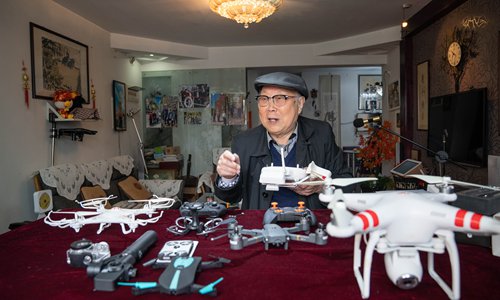HOME >> BUSINESS
Elderly ride digital economy wave
By Xinhua – Global Times Source:Global Times Published: 2019/10/10 21:13:40
Social media, mobile payment influence consumption habits

Ding Shilin presents his drones and other camera equipment bought online, at his home in Hangzhou, East China's Zhejiang Province. Photo: IC
He Xuping, a retiree in her 60s, is a skilled user of a smartphone equipped with over 50 apps, including those used for social networking, video sharing, online shopping, travel, mobile payment and financial management."I never have to run around to pay telephone and utility bills as all these can be done on the mobile phone now," she said. "The mobile internet has made my life much easier."
A growing number of seniors like He in East China's Hangzhou city are taking advantage of the internet to enrich their lives, accounting for over 17 percent of the total population as of 2017, according to the latest data from the Office of the National Working Commission on Aging.
A report of consumption behaviors during the just-concluded week-long National Day holidays, released by Alibaba on Sunday, also showed that the elderly have become a new driving force in the development of China's digital economy.
According to the data of the report, sales of instant noodles, instant hot-pot and instant rice on Tmall by consumers aged 50 and over rose by 101.9 percent on October 1, and by 128.3 percent and 122.2 percent on the two days following. This shows that older generations are opting for more convenient ways to cook with the help of online shopping.
The number of consumers aged 40 and above who visited medical institutions for health check-ups, dental care and cosmetic surgery nearly tripled from a year ago.
Data also showed that people aged 45 and over are a mainstay among customers who are good at seeking discounts using online platforms, such as dining out during off-peak hours and purchasing discount coupons for KTV and gym services.
The purchasing power of this demographic was felt well before the holiday. Sales of medical devices on Tmall's medical branch reached a small peak in September, with sales of wheelchairs surging by 33.2 percent from a year ago, and travel gadgets such as waist supporters by 50 percent.
The rising, tech-savvy elderly population in China has shown strong online consumption potential. A report on elderly mobile internet users published by Tencent last May showed that China is home to over 80 million senior netizens, and the number of senior internet users has skyrocketed by 130 percent since 2012.
The report also showed that over 85 percent of elderly mobile phone users had downloaded more than 20 apps, and half have more than 30 apps installed on their phones.
WeChat, the most popular social media app in China, claimed to have 61 million users aged between 55 and 70 as of September 2018, while Alibaba's Taobao and Tmall reported having about 30 million middle-aged and elderly online shoppers. Their average spending was about 5,000 yuan ($730) in the first nine months of 2018.
The consumption scale of China's elderly population will increase from 4 trillion yuan to about 106 trillion yuan between 2014 and 2050, accounting for 33 percent of the total GDP.
This will make China the country with the greatest market potential for the aging industry, according to a report from the Office of the National Working Commission on Aging.
"The prosperity of social media and the convenience of mobile payment have imperceptibly influenced the consumption habits of the elderly," said Fu Yifu of the Suning Institute of Finance.
A report on the consumption trends of the elderly population, published in August by the Institute, showed that as China's household income continues to rise, and the proportion of people with a high net worth aged between 30 and 50 is rising steadily. China's silver economy is expected to maintain steady momentum in the future.
"The elderly of different ages have distinct requirements for products and services in terms of food, housing, transportation, travel, shopping, medicine and entertainment, forming a large-scale, diversified and colorful 'silver economy' in China," said Fu.
Posted in: ECONOMY